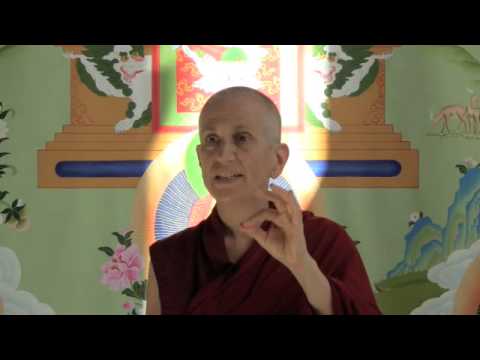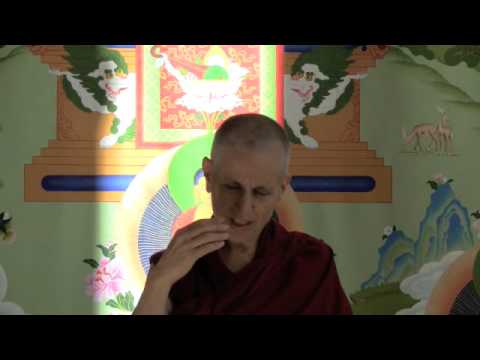The 10 non-virtues: 3 of body
The 10 non-virtues: 3 of body
Part of a series of Bodhisattva’s Breakfast Corner talks on the Stages of the Path (or lamrim) as described in the Guru Puja text by Panchen Lama I Lobsang Chokyi Gyaltsen.
- The non-virtues create negative karma
- Rejoicing in others’ negativities can create harm too
- Three non-virtues of body:
- Killing—taking life
- Stealing—taking what was not given to us
- Unwise sexual behaviour—any damaging sexual behaviour
To continue on about karma. When we go more into specifics about karma then we come to the topic of the ten non-virtues. So these are pathways of actions actually—they’re called “pathways” because they lead you to a rebirth, they’re paths to a rebirth—that the Buddha saw that if we get engaged in these it brings us a suffering kind of result. So, you should all know them by now. We may not remember the list, but we’ve done all the actions. We’re very familiar with all the actions. But when we ask for the list we’re like, huh? [laughter]
The ten non-virtues
There are three done physically:
- Killing—taking the life of a living being
- Stealing—taking what is not freely given. So this doesn’t mean that you have to have a bandit’s mask on. It just means taking what is not freely given to us
- Unwise and unkind sexual behavior
Those are the three physical ones.
There are four verbal ones:
- Lying—deliberately deceiving others
- Creating disharmony with our speech
- Harsh speech
- Idle talk
Those are the four verbal ones.
Then the three mental ones:
- Coveting
- Ill will or maliciousness
- And then wrong views
Non-virtues of body
Let’s go back over them. You’re thinking, “Oh, I’ve heard this so many times.” Well, you do them so many times. [laughter] We do them so many times, so we should listen to them so many times. Right?
Killing
Killing is taking the life of somebody else.
To do a complete action of killing we have to:
- identify the object that we want to kill,
- [Has three parts]:
- kill that exact thing
- have the intention to take the life
- have a deluded mental state (either attachment or ignorance or anger)
- and then to do the action of killing. And it doesn’t mean we have to do it ourselves. We can ask somebody else to do it.
- And then the conclusion is the other person dies before we do.
We have to be careful with this one because there are a lot of instances where we ask other people to kill for us, like we hire the exterminator. So these kinds of things create a very heavy negative karma.
Also, rejoicing at killing is certainly not anything virtuous. It may not be a complete action of killing, but if we read in the newspaper that so-and-so got killed, or they killed so many terrorists, or this or that, and we think “oh fantastic! Got those guys out of the way.” Or, “they had it coming to them, glad they got it.” Or if we rejoice at capital punishment, something like that, then we get some negative karma from it. May not be the complete action, but rejoicing in others’ negativities is not something good. And it certainly plants the seed to enable us to do that in the future. Because whatever we rejoice at, even if we haven’t done it, if we rejoice we’re going to be open to doing it.
Stealing
Then the second one is taking what hasn’t been freely given to us. So we usually think of robbery or burglary, but this is also borrowing something and then keeping it for ourselves without intending to return it. Not paying taxes that we’re supposed to pay, or not paying fees that we’re supposed to pay. Sneaking into the theater free and all that kind of stuff. So again, here too,
- there’s an object that we want to claim as our own,
- [Has three parts]
- we have to identify that object properly,
- have the intention to take it
- have a deluded mental state.
- Then we have to take it or ask somebody else to take it for us.
- And then the conclusion is that we consider it our own.
This one, there are many different ways to break it. If you work at a certain place and you take material from your workplace for your own private use, that wasn’t offered to you by your boss, that’s stealing, isn’t it? Using other people’s credit cards or phone cards, or all sorts of different ways that we have of kind of getting something on a bargain, but kind of shady, you know what I mean? It could involve cheating people, or lying and stealing in addition.
It’s very interesting, when we read the book Predictably Irrational, and they did these studies of students and how people just kind of fudge enough to take something that’s not really yours. Or to lie to get something you want. But it’s kind of “everybody does it.” And so nobody sees it as negative. Except not everybody really does it. But we think they do. So lots of ways we have to tell ourselves that this is actually mine and I deserve it.
Unwise and unkind sexual behavior
And then the third one we do physically, unwise and unkind sexual behavior, this one is principally going outside of one’s own relationship, or even if oneself is not in a relationship going with somebody who is. And so this is quite damaging to families, to oneself, to others. And I tend to generalize this one more and think of it as any kind of sexual behavior that’s going to be damaging to others physically or mentally. So, having a sexual relationship without taking care to prevent STDs. You know, I think that’s kind of irresponsible sexuality. Seeing other people as objects and just sleeping with them for one’s own pleasure. Looking at porn. Oh now everybody’s going to turn down the [volume, stop watching.] I’m really astounded by the number of people from all kinds of walks of life who are very respectable, but look at porn. And that’s just really objectifying people. And again, when you put that in your mind then the tendency is to act on it.
What to abandon, examining our lives
So, these kinds of things, to abandon them. Either abandon them, or do the opposite. Like protecting life. Protecting others’ possessions. Using sexuality wisely and kindly.
Tomorrow we’ll go on to the four verbal ones.
But it’s very helpful in our lives to do a little life review about these, and when have I gotten involved in them, and why have I done that? What was my mental state? what did I think I was going to get out of doing this? How did I feel afterwards? What am I going to do if a similar situation comes in the future? So instead of just saying, “Oh, I’m bad because I do them.” That doesn’t help much. But to really explore and understand the mental states that lead us to get involved in these actions, and then see what other kinds of mental states we need to cultivate so that we don’t continue acting in that way.
Venerable Thubten Chodron
Venerable Chodron emphasizes the practical application of Buddha’s teachings in our daily lives and is especially skilled at explaining them in ways easily understood and practiced by Westerners. She is well known for her warm, humorous, and lucid teachings. She was ordained as a Buddhist nun in 1977 by Kyabje Ling Rinpoche in Dharamsala, India, and in 1986 she received bhikshuni (full) ordination in Taiwan. Read her full bio.


